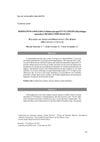 7 citations,
October 2018 in “Dermatology practical & conceptual”
7 citations,
October 2018 in “Dermatology practical & conceptual” Topical oxygen therapy may improve treatments for hair loss, acne, and chronic skin diseases with minimal side effects.
 1 citations,
February 2014 in “Revista de investigaciones veterinarias del Perú”
1 citations,
February 2014 in “Revista de investigaciones veterinarias del Perú” A pet rabbit had a skin infection that was cured with ketoconazole.
[object Object]  April 2024 in “International journal of clinical trials”
April 2024 in “International journal of clinical trials” SesZen-Bio™ improves hair density, thickness, and overall hair health.
 March 2024 in “International journal of pharmaceutical sciences and drug research”
March 2024 in “International journal of pharmaceutical sciences and drug research” Androgenetic alopecia is influenced by various factors and can be treated with medications, procedures, and non-drug methods.
 April 2011 in “Global journal of health science”
April 2011 in “Global journal of health science” Aldactone effectively reduces hair thickness in women with excessive hair growth, both alone and with other treatments.
 April 2011 in “Global journal of health science”
April 2011 in “Global journal of health science” Spironolactone effectively makes hair shafts thinner in women with excessive hair growth.
January 2025 in “Dermatology Practical & Conceptual” This study on 45 women with female pattern hair loss (FPHL) compared the efficacy and safety of topical finasteride 1%, spironolactone 5%, and minoxidil 5% over 16 weeks. Both finasteride and minoxidil demonstrated significant improvements in hair density and reduced signs of hair loss, such as yellow dots and single hair follicular units, while spironolactone did not show significant changes. The study concluded that topical finasteride is as effective and safe as minoxidil, providing an alternative for those who do not respond to or experience side effects from minoxidil.
 February 2022 in “International Journal of Research in Dermatology”
February 2022 in “International Journal of Research in Dermatology” Topical minoxidil is the primary treatment for female pattern hair loss in India.
December 2021 in “International Journal of Research in Dermatology” Female pattern hair loss in Saudi women is linked to low iron and vitamin D levels.
December 2021 in “International Journal of Research in Dermatology” Early diagnosis and personalized treatment are crucial for managing hair loss in India.
18 citations,
January 2019 in “European journal of histochemistry” Cattle skin has leptin which might control skin and hair growth.
 15 citations,
July 2021 in “Bosnian Journal of Basic Medical Sciences”
15 citations,
July 2021 in “Bosnian Journal of Basic Medical Sciences” Stem cell therapy is promising for treating various health conditions, but more research is needed to understand its full potential and address challenges.
1 citations,
December 2019 in “World rabbit science” High doses of cobalt stopped hair growth in rabbits.

A 15% clove leaf extract shampoo promotes hair growth but is less effective than minoxidil.
 July 2022 in “International Journal of Applied Pharmaceutics”
July 2022 in “International Journal of Applied Pharmaceutics” Machine learning and deep learning can effectively diagnose alopecia areata.
 94 citations,
January 2000 in “The Journal of Clinical Endocrinology and Metabolism”
94 citations,
January 2000 in “The Journal of Clinical Endocrinology and Metabolism” Spironolactone most effective for hirsutism, but has side effects.
 75 citations,
November 1996 in “Fertility and Sterility”
75 citations,
November 1996 in “Fertility and Sterility” Finasteride effectively reduces hair growth in women with idiopathic hirsutism, but requires careful contraception during treatment.
 66 citations,
June 2018 in “International Journal of Women's Dermatology”
66 citations,
June 2018 in “International Journal of Women's Dermatology” No cure for female pattern hair loss, but various effective treatments exist.
 33 citations,
October 1994 in “The Journal of Clinical Endocrinology and Metabolism”
33 citations,
October 1994 in “The Journal of Clinical Endocrinology and Metabolism” Finasteride reduces hair growth and is safe for women with excessive hair.
 31 citations,
June 2011 in “Movement Disorders”
31 citations,
June 2011 in “Movement Disorders” The document describes a woman with familial Parkinson's disease due to a genetic mutation, showing severe symptoms and poor response to treatment, and suggests finasteride may help reduce symptoms in Tourette syndrome.
 16 citations,
January 2000 in “The Journal of clinical endocrinology and metabolism/Journal of clinical endocrinology & metabolism”
16 citations,
January 2000 in “The Journal of clinical endocrinology and metabolism/Journal of clinical endocrinology & metabolism” Antiandrogen drugs can reduce PSA levels in women with excess hair, suggesting PSA is a sign of male hormone activity in women.
37 citations,
November 2017 in “Medical Sciences” Melanoma's complexity requires personalized treatments due to key genetic mutations and tumor-initiating cells.
 April 2024 in “Journal of endocrinological investigation”
April 2024 in “Journal of endocrinological investigation” Topical minoxidil helps transgender individuals assigned female at birth grow more facial hair.
 11 citations,
October 2018 in “Hormone and Metabolic Research”
11 citations,
October 2018 in “Hormone and Metabolic Research” Women with PCOS have similar bone density to healthy women, but those who are obese have higher bone density at some body sites.
[object Object]  4 citations,
January 2017 in “Acta Endocrinologica”
4 citations,
January 2017 in “Acta Endocrinologica” Finasteride and metformin both help treat PCOS, but using them together works best.
 December 2020 in “Current Sexual Health Reports”
December 2020 in “Current Sexual Health Reports” Finasteride can have lasting negative effects on brain function and behavior by disrupting neurosteroid production.
 February 2020 in “Diabetologie Und Stoffwechsel”
February 2020 in “Diabetologie Und Stoffwechsel” The document concludes that more research is needed to include new treatments in guidelines for Polycystic Ovary Syndrome (PCOS).
 258 citations,
July 2016 in “Reproductive Biology and Endocrinology”
258 citations,
July 2016 in “Reproductive Biology and Endocrinology” The document concludes that insulin resistance is key in PCOS development and early treatment is crucial to prevent complications.
 192 citations,
September 2003 in “The Journal of clinical endocrinology and metabolism/Journal of clinical endocrinology & metabolism”
192 citations,
September 2003 in “The Journal of clinical endocrinology and metabolism/Journal of clinical endocrinology & metabolism” Metformin is effective for treating excessive hair growth in women with PCOS and may work better than the standard treatment in some ways.
 90 citations,
August 2002 in “European journal of endocrinology”
90 citations,
August 2002 in “European journal of endocrinology” Metformin improves hair growth and menstrual frequency in women with PCOS and hirsutism.
























